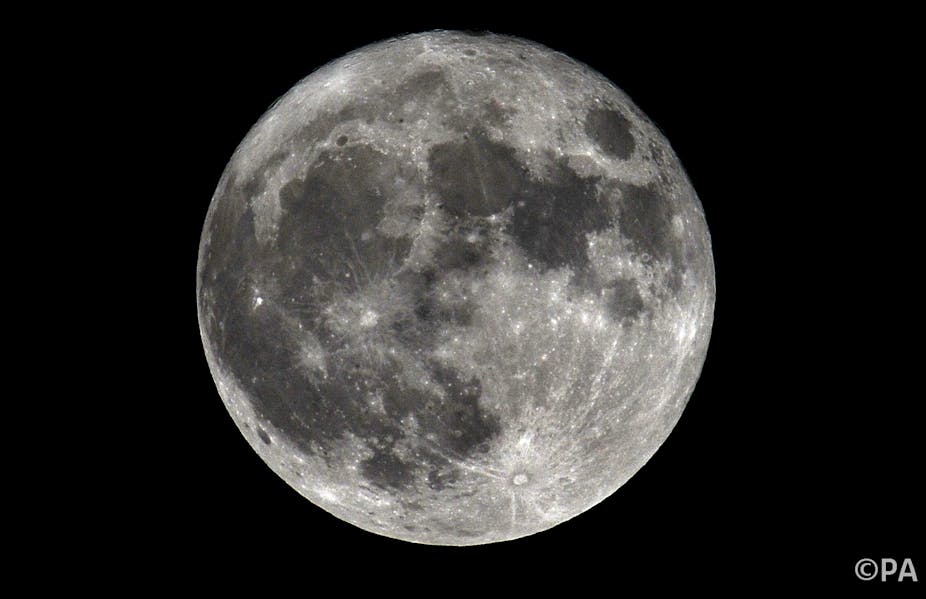As a teenager I observed a strange phenomenon. On awakening from an unusually vivid dream, I would often find that the moon was full. And as the silvery light prevailed on subsequent nights, my nocturnal adventures were of similar intensity.
Perhaps this was perceptual bias or selective recall. By the time I began training as a mental health nurse, I’d abandoned this fleeting curiosity for naïve rationalism because I was keen to comprehend the scientific basis of thoughts, feelings and behaviour.
But I was surprised to find that on psychiatric wards, many nurses were convinced that patients were more disturbed at full moon. How can professional people maintain this figment of folklore?
Now a new study from the University of Basel reports evidence of a link between lunar cycles and the quality of our sleep. Many would be keen to dismiss it, but should we?
Lunacy and lunar changes
For my book, The Moon and Madness, I studied the legend of lunacy from ancient times through to modern psychology and psychiatry.
The word lunacy itself derives from the Latin lunaticus, meaning “of the moon” and has long been associated with mental health. Aristotle and Pliny the Elder both linked the light of the full moon to an effect on mental health.
Scrutinising the multitude of studies of lunar influence since the 1960s, it’s clear that despite some positive findings, correlation of behaviour with the phases of the moon remains speculative.
However, does a lack of evidence equate to a lack of effect? With an open mind, I considered the two main mechanisms by which the moon is reputed to affect us: tidal forces and moonlight.
Gravitational hypothesis, the theory that gravitational pull has the power to affect our feelings and behaviour, is dubious because the moon doesn’t really have a noticeable influence on bodily fluid.

But the direct effect of moonlight would be a reasonable premise for further research because light itself is not mystical (we know bright light can be a disturbing stimulus). More controversial is whether it’s sufficient to cause mental disturbance.
To study this further we need data not only on the lunar cycle, but also on weather conditions.
In 2006, scientists at the University of Berne found that a sample of healthy volunteers slept for an average of 19 minutes less at full moon than at new moon. According to Roosli and colleagues, this would have little impact on most people’s lives.
But I wonder whether research that targeted people with conditions susceptible to sleep disruption, such as bipolar affective disorder and epilepsy, may show a greater sleep differential and more significant consequences. It is already known that loss of sleep can provoke epileptic seizures or a manic episode.
The Basel study
The University of Basel study, by Christian Cajochen and fellow chronobiologists, has provided perhaps the strongest indication yet that the moon really does affect the mind.
From rigorously-collected data on 33 volunteers in a study of sleep quality and ageing, measuring brain activity, hormone secretions and phases of sleep, the researchers rather whimsically decided to analyse the effect of the lunar cycle.
At full moon, the peak in melatonin levels (necessary for inducing sleep) was delayed by around 50 minutes; participants took an average of five more minutes to fall asleep; brain activity related to deep slumber decreased by 30%; and there was a similar shortening of duration to that found by Roosli and his team. Shallower sleep, deeper dreams – perhaps my teenage impression was right after all.

A criticism of studies that look at the effect of moonlight is that researchers don’t consider the impact of modern lighting on subjects’ sleep-wake cycle - something that would never have affected humans in earlier days. Before modern lighting, the moon would have been a more significant source of light.
As the Basel study isolated participants from fluctuations from natural light, the results suggest we have a innate circalunar rhythm, that is, a body clock of physiological activity with a length that roughly correlates to the length of the lunar cycle (29.5 days).
As an evolutionary artefact, this would serve little purpose in our manipulated environment of artificial lighting and alarm clocks. However, the stimulus of a full moon could be a rhythmic regulator, and in some people it could exacerbate a metaphorical “high tide”.
Irrespective of such rhythm, lunar luminosity could have profound impact by prolonging the phase of sleep that enables dreaming, as observable in rapid eye movements (REM). By provoking floridly psychotic and disturbing dreams in someone with schizophrenia, the full moon could contribute to a relapse.
Lunar studies risk ridicule
There are obvious limitations with this latest study. The sample was small, and the duration short.
However, it fires a starting pistol for replication studies. If the moon can be shown to alter sleep patterns in the general population, this would be a dramatic rebuttal to those mainstream scientists who have abandoned the true scientific attitude of doubt to dismiss any possibility of lunar influence (you know who you are).
Enquiry into lunar influence risks ridicule. In this context, the research has not developed from piecemeal studies, often methodologically weak and devoid of hypotheses.
Nobody could seriously argue that the moon causes mental disorder. A lunar effect, if it exists, would be a marginal factor in mental health. Evidence that psychiatric symptoms correlate with lunar cycles could justify varying a dose of medication. But anticonvulsants, antipsychotics and mood stabilisers are likely to reduce sensitivity to environmental stimuli by ironing out natural rhythms.
That could be why the full moon madness observed by older nurses in the mental hospitals is not discernible today. For researchers to deprive people of the medication on which their stability depends would be seen as unethical.
Despite the many challenges in investigating lunar influence in psychology, psychiatry and neurology, the findings of Cajochen and colleagues should hopefully give this area of research some momentum. It’s still too early to put the moon to bed.

